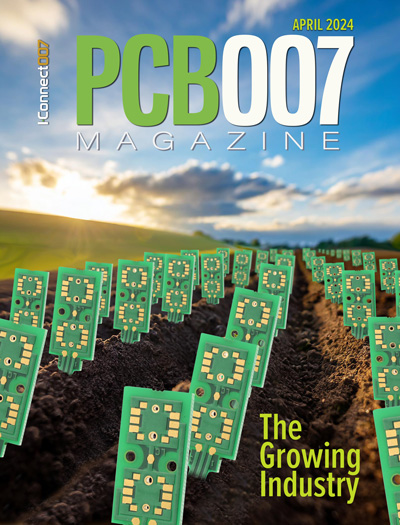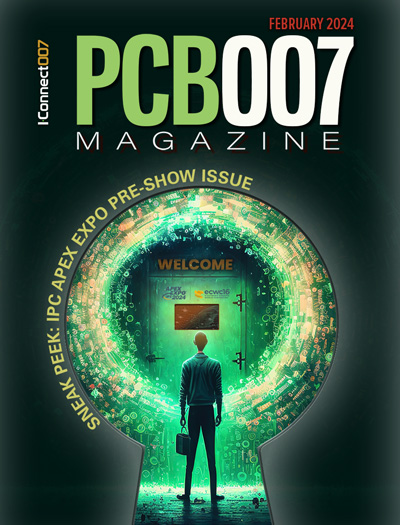-

- News
- Books
Featured Books
- pcb007 Magazine
Latest Issues
Current Issue
The Growing Industry
In this issue of PCB007 Magazine, we talk with leading economic experts, advocacy specialists in Washington, D.C., and PCB company leadership to get a well-rounded picture of what’s happening in the industry today. Don’t miss it.

The Sustainability Issue
Sustainability is one of the most widely used terms in business today, especially for electronics and manufacturing but what does it mean to you? We explore the environmental, business, and economic impacts.

The Fabricator’s Guide to IPC APEX EXPO
This issue previews many of the important events taking place at this year's show and highlights some changes and opportunities. So, buckle up. We are counting down to IPC APEX EXPO 2024.
- Articles
Article Highlights
- Columns
Search Console
- Links
- Events
||| MENU - pcb007 Magazine
MACFEST—Manufacturing Advanced Coatings for Future Electronic Systems
May 30, 2016 | Dr. Andrew Ballantyne and Prof. Karl Ryder, University of LeicesterEstimated reading time: 1 minute
Now in its second year, MACFEST is a collaborative research project involving partners A-Gas Electronic Materials, C-Tech Innovation, MTG Research, the Institute of Circuit Technology, the University of Leicester and Merlin Circuit Technology. Partly funded by Innovate UK (formerly the Technology Strategy Board), the aim of the project is the development of new “universal” PCB surface finishes which are suitable for both solder reflow and gold wire bonding. This will help PCB manufacturers meet the performance demands for high value electronic systems, ensuring long term reliability, even in harsh environmental conditions. In addition, the use of deep eutectic solvents (DESs), a patented technology of the University of Leicester, offers the ability to significantly reduce the environmental impact of a number of PCB plating technologies, reducing the requirements for use of cyanide and toxic/corrosive acids in plating baths.
DESs are a novel class of solvents similar to ionic liquids (ILs). Whereas ILs are composed exclusively of ions, DESs are liquids composed of a salt and complexing agent, commonly a tetraalkylammonium salt, such as choline chloride, and a hydrogen bond donor (HBD), such as 1,2-ethanediol or urea[1] When mixed together the HBD binds to the anion, resulting in a large depression of the melting point. At Leicester we have used DESs in the development of immersion silver[2, 3], electroless nickel-immersion gold (ENIG)[4] and hot air solder levelled electroless nickel (HASLEN) processes, each of which offer its own benefits over existing processes[5] from the reduced safety and environmental concerns mentioned above as well as, in some cases, the removal of existing failure mechanisms such as black pad.
The MACFEST project is building on this previous work in the development of a new, state-of-the-art PCB surface finish for use in both reflow and wire bonding applications.
Editor's Note: This article originally appeared in the May 2016 issue of The PCB Magazine.
Suggested Items
Taiyo Circuit Automation Installs New DP3500 into Fuba Printed Circuits, Tunisia
04/25/2024 | Taiyo Circuit AutomationTaiyo Circuit Automation are proud to be partnered with Fuba Printed Circuits, Tunisia part of the OneTech Group of companies, a leading printed circuit board manufacturer based out of Bizerte, Tunisia. on their first installation of Taiyo Circuit Automation DP3500 coater.
Vicor Power Orders Hentec Industries/RPS Automation Pulsar Solderability Testing System
04/24/2024 | Hentec Industries/RPS AutomationHentec Industries/RPS Automation, a leading manufacturer of selective soldering, lead tinning and solderability test equipment, is pleased to announce that Vicor Power has finalized the purchase of a Pulsar solderability testing system.
AIM Solder’s Dillon Zhu to Present on Ultraminiature Soldering at SMTA China East
04/22/2024 | AIMAIM Solder, a leading global manufacturer of solder assembly materials for the electronics industry, is pleased to announce that Dillon Zhu will present on the topic: Ultraminiature Soldering: Techniques, Technologies, and Standards at SMTA China East. This event is being held at the Shanghai World Expo Exhibition & Convention Center from April 24-25.
AIM to Highlight NC259FPA Ultrafine No Clean Solder Paste at SMTA Wisconsin Expo & Tech Forum
04/18/2024 | AIMAIM Solder, a leading global manufacturer of solder assembly materials for the electronics industry, is pleased to announce its participation in the upcoming SMTA Wisconsin Expo & Tech Forum taking place on May 7 at the Four Points by Sheraton | Milwaukee Airport, in Milwaukee, Wisconsin.
Hentec/RPS Publishes an Essential Guide to Selective Soldering Processing Tech Paper
04/17/2024 | Hentec Industries/RPS AutomationHentec Industries/RPS Automation, a leading manufacturer of selective soldering, lead tinning and solderability test equipment, announces that it has published a technical paper describing the critical process parameters that need to be optimized to ensure optimal results and guarantee the utmost in end-product quality.


